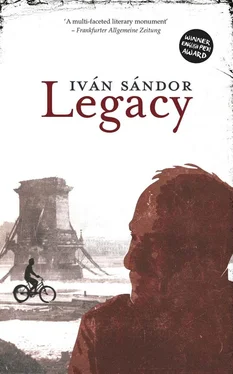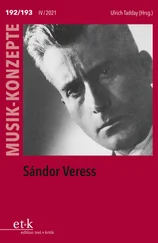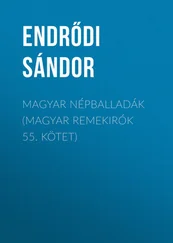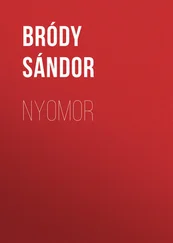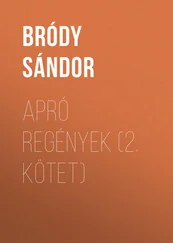Maybe Gizi never did come back and sit on the bed; maybe she did not talk about Bőzsi. Mother’s gaze may be switching between what actually happened and the imagined; such uncertainty is familiar ground for a gaze, and it guides my own, too. I do not visualize Gizi sitting on the hospital bed, but the hand gesture that Bőzsi makes comes to mind, only the hand gesture. I don’t see her, so that flutter doesn’t seem to be her hair. Might that change over time into a gesture?
Gizi went not long after that, says Mother. She had to get Vera’s name written into our papers. The only way of doing that is put it under yours as if she was your younger sister; so Vera was given our family name. Do you remember what she said when I told her that now she had to behave accordingly and say that we are her parents and you’re her elder brother?
I couldn’t remember.
She said, Mother says, But that would only be until my real parents returned, wouldn’t it?
Perhaps what Mother is thinking of is that Vera’s parents never did return.
But she couldn’t have known that then.
Gizi brought a new safe-conduct letter, she says. Lutz’s signature on it was genuine. That was on Christmas Eve. She also brought chocolates and recounted that Lutz had met a very high-ranking German officer at the Gellért Hotel. She and the Lutzes had dined in the restaurant because Gertrud had insisted that Gizi eat dinner with them. That’s something you weren’t in a position to remember, says Mother. There was a time your father and I had dinner at the Gellért with Gizi and Józsi. At that time Józsi could not wear his officer’s uniform, and Gizi had not as yet dyed her hair; it was dark brown and was shoulder-length; she had a tobacco-coloured evening dress, which she chose to go with Józsi’s worsted; mine was mauve to go with your father’s dinner jacket. We got the money from your grandfather, although your grandmother could not have known about that, of course.
Whatever happened, and however it happened, Mother’s gaze vanquished time. For her, whether I was approaching the fifteenth year of my life or three decades older, I was and always remained her little boy. When she was lying tucked up in the intensive-care unit with drips in her arm and sheets up to her chin, I bent over her and pressed the palms of my hands together — not the way Grandmother pressed them together during prayers but in order to move them left and right in front of her open eyes to see whether her eyelids would quiver, but they didn’t. She had only hours left, and I understood that I now had to take on the full weight of her look, which could no longer respond itself.
This assumption of responsibility was one of a number of occasions when I attempted to will myself across an unbridgeable gulf in unconscious preparation for my investigation.
It could be that there weren’t four of us at the Gellért; maybe it was more, maybe Bőzsi was there and others as well.

Gizi is sitting in the Gellért Hotel restaurant. Carl Lutz and Gertrud are seated opposite each other. A waiter brings in bowls of bouillon, having first, with a ceremonial flourish, placed on his tray the soup plates that had been set out on the table. Gizi is seated opposite the window, so she can see the barbed-wire barriers on the square in front of the hotel and the gun placed at the Buda end of the Franz Joseph Bridge. The food was brought in on silver platters. What time is he coming? Gertrud asks Carl Lutz. Soon, says Lutz. Gizi does not ask who they are talking about; because they were not sitting opposite a window that overlooked the Danube they were unable to see that armed men were shepherding a small group across the square.
Gizi smiles and tactfully glances at Gertrud; the two women can share the reason why she is glancing at her and not at Carl Lutz, and Gizi even bursts out laughing when Gertrud breaks into a laugh. Of course, darling, it’s no big deal. If you’ve got to go, you’ve got to go. As if they were laughing over the fact that Gertrud can now say ‘it’s no big deal’ flawlessly in Hungarian, she gets up airily and heads off towards the ladies. There are military officers seated among the guests, the younger of them giving Gizi conspicuous glances, so when she feels that nobody is looking she races down from the mezzanine and, as she leaves the entrance, almost stumbles into a barbed-wire barrier. By now the group has crossed Gellért Square. There is a young woman walking in the back row, beside her a policemen with rifle; the woman’s hair is ruffling and she smoothes it down. Gizi reaches her and grabs her by the arm. The young woman breaks into a smile; there is understanding in the smile, dignity. Gizi smoothes down her hair and plants a kiss on her forehead, the policemen pulls her away and the procession carries on. Gizi would like to accompany them, but already as much time has passed as would have been necessary to hurry off to the toilet, so she returns to the restaurant and, as she again passes the officers’ table, she notices a general is arriving in great haste and giving instructions to the colonel seated at the head of the table.
The colonel salutes and sets off to the neighbouring wing of the dining hall.
Gizi had not noticed before, but now it strikes her eye that sitting at the corner table is a writer whom she knows by sight; indeed, she obtained a signature from him a few years before at one of the Book Week tents. The writer has just finished his dinner and has taken out a notebook in which he starts to write.
‘I pick my way between trestles carrying coils of barbed wire to dine at the Gellért Hotel,’ writes Sándor Márai in his Diary .
The saloon bar was destroyed a few days ago by a bomb from an intruder aircraft; more than a few guests died, but nobody speaks about the death toll; in the grand upper restaurant tables are laid with immaculate linen tablecloths and napkins, tasty and not all that expensive dishes are served noiselessly on silver platters by superbly trained waiters. For twelve pengő I can dine in a peacetime setting with electric lighting; well-dressed people are seated at the tables, the waiters’ dickies are dazzlingly white. From the window I can see a big gun guarding the bridge and the hotel’s entrance along with several barbed-wire thickets, which will be used to defend Gellért Hill when it comes to close combat. A group approaches in the street: older and younger women with headscarves, children — Jews being sent to some site for deportation. Two policemen with rifles are steering the group; not one word of comment from anybody in the splendid, warm, well-lit dining-room.
Gizi watches the writer making notes and sees that he is about to leave. She also sees an SS colonel enter the dining-room, halt in front of a Hungarian general and salute with a raised arm, although the general seems not to notice that the colonel misses out Hitler’s name with the Heil! but hurries on and extends a hand to greet Carl Lutz.
Gizi always got out of the old Opel Kadett when they encountered a column on the highway to Hegyeshalom.
SS Obergruppenführer Hans Jüttner, coming from Vienna, got out from his car the first time at Abda, just outside Győr. When he glanced in the Opel’s window and with a smile enquired after Gizi’s accommodation, standing beside him had been SS Standartenführer Kurt Becher.
Becher is waiting at Carl Lutz’s table. Smiling. He has thick, dark eyebrows, thick lips. He kisses the hand first of Gertrud then Gizi. Although she recognizes him, Gizi cannot tell whether he recognizes her.
On the highway Gizi had on a Red Cross armband and a starched white cap. The Colonel takes a long look at her. Gizi tidies her hair behind the ear with a single gesture.
Читать дальше
